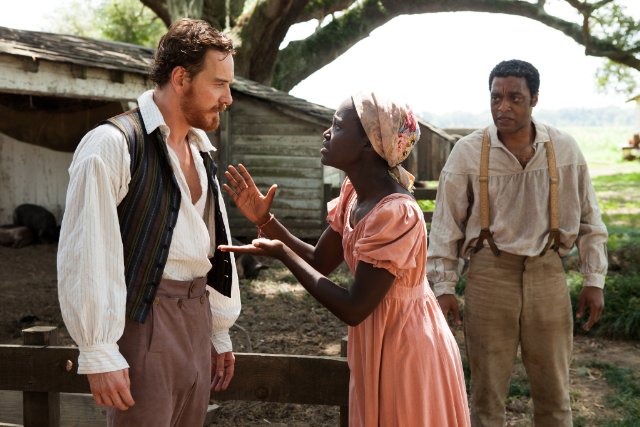
12 Years a Slave
Overall: 3.5/4
Director: Steve McQueen
Written By: John Ridley, Solomon Northrup
Starring: Chitwetel Ejiofor, Michael Fassbender
Runtime: 134 minutes
Rating: R
Let me begin this review of Steve McQueen’s 12 Years a Slave by saying that I am not going to talk about what has become the norm for film critics to discuss when reviewing this film. I will not go on about the film’s controversial reputation, interpretation of slavery, or perceptions of how slavery is typically depicted in the movies. I will speak on this film as an art piece, and judge it based on its merits as such.
From that perspective, Twelve Years a Slave is excellent. The film is truly an actor’s piece. Without such strong performances, it could easily have faltered and come off as overly dramatic and sappy. The film centers on Chiwetel Ejiofor, who plays Solomon Northrup, an escaped slave who is recaptured and sold back into the harsh world of southern slavery. Ejiofor is sensational as Northrup. His performance is a rare feat of acting in that he creates a man who is so withered and beat down by his circumstances, yet remains hopeful and resilient. Through all of that, Ejiofor manages to avoid being an over blown sentimental caricature, which another actor might have gone for.
Ejiofor’s performance is also helped along the way by great supporting turns from Benedict Cumberbach, Paul Dano, Michael Fassbender, Sarah Paulson, Brad Pitt, and Lupita Nyong’o. The most affecting and haunting of the supporting performances is Fassbender, who has appeared in McQueen’s previous two films Hunger, and Shame. Here, he portrays a plantation owner who takes Northrup from a previous slave owner after trouble had arisen on that last plantation. The trouble came about because Northrup, being an educated and smart man, knew how to do things more efficiently than Paul Dano’s character, a white carpenter trying to build cabins for his boss, played by Cumberbach. In two of the most astonishing and gut-wrenching scenes in the film, Northrup proceeds to fight back against Dano’s character when he attempts to beat him, and is later captured by Dano and hung from a tree, with just his toes touching the ground. In this film, McQueen employs his trademark technique of using an unbroken long take to capture Northrup’s struggle to stay standing and breathing, in a scene so powerful it sticks with you for days after the film.
Following this encounter, Cumberbach’s character, an admirer of Northrup and a plantation owner who seems to take better care for his slaves than others, sends Nothrup off to Edwin Epp’s plantation. Played by Fassbender, Edwin Epps is a brutal man who makes it a point to have one beating a day for the slowest worker, and frequently rapes a female slave played by Nyong’o. Fassbender’s great performance is on full display during a scene in which he reads from the bible to his slaves, and tells them that the bible preaches slavery as a way of life. It is Northrup, a man who has read the bible, that is most pained by this, not because it is wrong, but because he cannot tell anyone it is wrong.
To go along with the superb acting, cinematographer Sean Bobbit’s images are stunning. Creating a beautiful environment that encompasses Northrup’s harsh reality. Though the cutaway shots show the beauty of this land, the most impressive camera work comes when the camera is a character itself. One of McQueen’s trademark techniques, long takes, is employed throughout the film masterfully, along with the use of shallow and long focus. It is through these techniques that the camera becomes a character; it is giving us emotions through its movement, creating new feelings inside of you as the camera moves.
Another key element of the film is the sound design. The world around Northrup creates a stirring orchestra that plays throughout the film that includes insects, rivers, wind, and all of nature stirring and moving between loud and quiet to help construct the mood of a scene.
As the film comes to a close, and Northrup returns to the north (how he does it I will not say, but since he published the book, I feel giving this information won’t spoil the film) viewers are given closure to the film. Although he ended up free again, it is not the kind of cop out ending Hollywood usually delivers. You are relieved he made it, but disturbed that so many others did not.
In conclusion, 12 Years a Slave is an excellent movie, not because of what it says, but how it says it. And it’s guaranteed to be remembered for a long, long time.
















